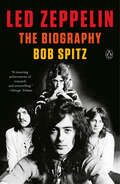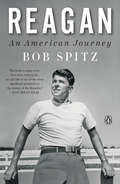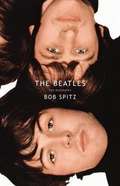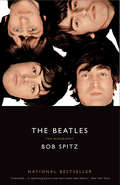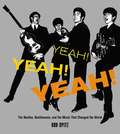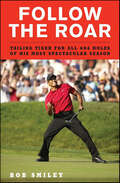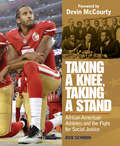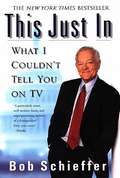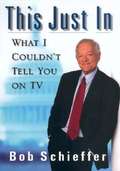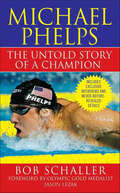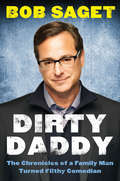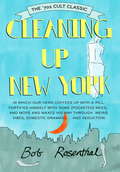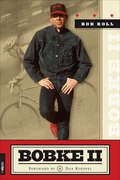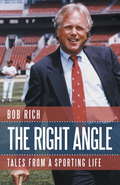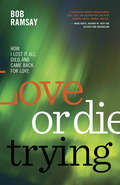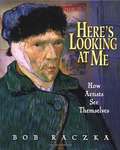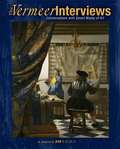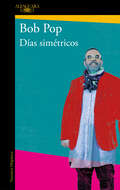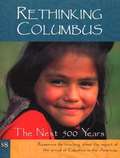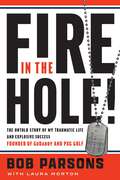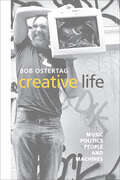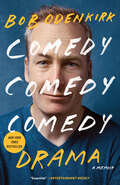- Table View
- List View
Led Zeppelin: The Biography
by Bob Spitz&“In this authoritative, unsparing history of the biggest rock group of the 1970s, Spitz delivers inside details and analysis with his well-known gift for storytelling.&” —PEOPLEFrom the author of the iconic, bestselling history of The Beatles, the definitive account of arguable the greatest rock band of all time.Rock star. Whatever that term means to you, chances are it owes a debt to Led Zeppelin. No one before or since has lived the dream quite like Jimmy Page, Robert Plant, John Paul Jones, and John Bonham. In Led Zeppelin, Bob Spitz takes their full measure, separating myth from reality with his trademark connoisseurship and storytelling flair.From the opening notes of their first album, the band announced itself as something different, a collision of grand artistic ambition and brute primal force, of English folk music and African American blues. Spitz&’s account of their artistic journey, amid the fascinating ecosystem of popular music, is irresistible. But the music is only part of the legend: Led Zeppelin is also the story of how the sixties became the seventies, of how innocence became decadence, of how rock took over. Led Zeppelin wasn&’t the first band to let loose on the road, but as with everything else, they took it to an entirely new level. Not all the legends are true, but in Spitz&’s careful accounting, what is true is astonishing and sometimes disturbing.Led Zeppelin gave no quarter, and neither has Bob Spitz. Led Zeppelin is the long-awaited full reckoning the band richly deserves.
Reagan: An American Journey
by Bob SpitzFrom New York Times bestselling biographer Bob Spitz, a full and rich biography of an epic American life, capturing what made Ronald Reagan both so beloved and so transformational. <P><P>More than five years in the making, based on hundreds of interviews and access to previously unavailable documents, and infused with irresistible storytelling charm, Bob Spitz's REAGAN stands fair to be the first truly post-partisan biography of our 40th President, and thus a balm for our own bitterly divided times. <P><P>It is the quintessential American triumph, brought to life with cinematic vividness: a young man is born into poverty and raised in a series of flyspeck towns in the Midwest by a pious mother and a reckless, alcoholic, largely absent father. <P><P>Severely near-sighted, the boy lives in his own world, a world of the popular books of the day, and finds his first brush with popularity, even fame, as a young lifeguard. Thanks to his first great love, he imagines a way out, and makes the extraordinary leap to go to college, a modest school by national standards, but an audacious presumption in the context of his family's station. From there, the path is only very dimly lit, but it leads him, thanks to his great charm and greater luck, to a solid career as a radio sportscaster, and then, astonishingly, fatefully, to Hollywood. And the rest, as they say, is history. <P><P>Bob Spitz's REAGAN is an absorbing, richly detailed, even revelatory chronicle of the full arc of Ronald Reagan's epic life - giving full weight to the Hollywood years, his transition to politics and rocky but ultimately successful run as California governor, and ultimately, of course, his iconic presidency, filled with storm and stress but climaxing with his peace talks with the Soviet Union that would serve as his greatest legacy. It is filled with fresh assessments and shrewd judgments, and doesn't flinch from a full reckoning with the man's strengths and limitations. <P><P>This is no hagiography: Reagan was never a brilliant student, of anything, and his disinterest in hard-nosed political scheming, while admirable, meant that this side of things was left to the other people in his orbit, not least his wife Nancy; sometimes this delegation could lead to chaos, and worse. <P><P>But what emerges as a powerful signal through all the noise is an honest inherent sweetness, a gentleness of nature and willingness to see the good in people and in this country, that proved to be a tonic for America in his time, and still is in ours. It was famously said that FDR had a first-rate disposition and a second-rate intellect. <P><P>Perhaps it is no accident that only FDR had as high a public approval rating leaving office as Reagan did, or that in the years since Reagan has been closing in on FDR on rankings of Presidential greatness. <P><P>Written with love and irony, which in a great biography is arguably the same thing, Bob Spitz's masterpiece will give no comfort to partisans at either extreme; for the rest of us, it is cause for celebration.
The Beatles: The Biography
by Bob SpitzAs soon as The Beatles became famous, the spin machine began to construct a myth--one that has continued to this day. But the truth is much more interesting, much more exciting, and much more moving. In this masterpiece, Bob Spitz has written the biography for which Beatles fans have been waiting. 32 pages of b/w photos.
The Beatles: The Biography
by Bob SpitzAs soon as The Beatles became famous, the spin machine began to construct a myth--one that has continued to this day. But the truth is much more interesting, much more exciting, and much more moving. In this bestselling book, Bob Spitz has written the biography for which Beatles fans have long waited. 32 pages of b/w photos.
YEAH! YEAH! YEAH!: The Beatles, Beatlemania, and the Music that Changed the World
by Bob SpitzIt starts in the housing projects and school playgrounds of Liverpool, where four boys would discover themselves--and a new form of music called rock 'n roll. It takes us from the famous first meeting between John and Paul, to the clubs of Liverpool and Germany when George and Ringo join the band, down Penny Lane and Strawberry Fields, to America and the height of the Beatles' success--when they were still teenagers. In Yeah! Yeah! Yeah!, Spitz recreates the thrills, tears and magic of his New York Times bestselling adult biography, but in a style and format that's accesible for young readers. This book includes photos, sidebars and graphic elements. It's a book about teens who changed the world.
Treehab: Tales from My Natural, Wild Life
by Bob SmithIn this bitingly funny and often surprising memoir, award-winning author and groundbreaking comedian Bob Smith offers a meditation on the vitality of the natural world--and an intimate portrait of his own darkly humorous and profoundly authentic response to a life-changing illness. In Treehab--named after a retreat cabin in rural Ontario--Smith muses how he has "always sought the path less traveled." He rebuffs his diagnosis of ALS as only an unflappable stand-up comic could ("Lou Gehrig's Disease? But I don't even like baseball!") and explores his complex, fulfilling experience of fatherhood, both before and after the onset of the disease. Stories of his writing and performing life--punctuated by hilariously cutting jokes that comedians tell only to each other--are interspersed with tales of Smith's enduring relationship with nature: boyhood sojourns in the woods of upstate New York and adult explorations of the remote Alaskan wilderness; snakes and turtles, rocks and minerals; open sky and forest canopy; God and friendship--all recurring touchstones that inspire him to fight for his survival and for the future of his two children. Aiming his potent, unflinching wit at global warming, equal rights, sex, dogs, Thoreau, and more, Smith demonstrates here the inimitable insight that has made him a beloved voice of a generation. He reminds us that life is perplexing, beautiful, strange, and entirely worth celebrating.
Follow the Roar: Tailing Tiger for All 604 Holes of His Most Spectacular Season
by Bob SmileyWith his career at a standstill and his golf game a shadow of its former mediocrity, TV writer and ESPN.com contributor Bob Smiley decided the time had come to turn to the one person who might be able to help: Tiger Woods. So, in January of 2008, Smiley set out to follow the game's greatest player from the gallery for every hole of an entire season and to absorb all that he could.Smiley traveled from the seaside cliffs of San Diego to the deserts of Dubai, through the hallowed gates of Augusta National, and on to arguably the greatest U.S. Open of all time back at Torrey Pines, where, in a legendary duel with charismatic journeyman Rocco Mediate, Woods won his fourteenth major—on one leg.Smiley chronicles every dramatic and often hysterical moment of his journey with Tiger, including his off-course run-ins with Arabian sandstorms, ex-con ticket scalpers, and the motley assortment of strangers who became friends along the way.Told from the perspective of a true golf fan, Follow the Roar is a once-in-a-lifetime adventure through the most spectacular and inspiring season in Tiger Woods's celebrated career. In addition to the thrill of witnessing all 604 holes Woods played in '08, Smiley found in Tiger both inspiration and the gutsy embodiment of what it really means to be an athlete—and a man.
Taking a Knee, Taking a Stand: African American Athletes and the Fight for Social Justice
by Bob SchronA history of the activism and achievement of African American athletes from Jesse Owens to Serena Williams to Colin Kaepernick, who advanced the cause of social justice through their outspokenness, commitment, and integrity. Muhammad Ali refused to fight in a war he believed was immoral. Wilma Rudolph retired from track and field to campaign for civil rights. Colin Kaepernick took a knee during the national anthem to draw attention to the oppression of black bodies. Taking a Knee, Taking a Stand tells their stories and the stories of other prominent African American male and female athletes who often risked their careers to fight racial discrimination and promote social justice. From Jackie Robinson breaking the color line in major league baseball to NBA great Bill Russell sitting at the feet of Dr. Martin Luther King at the 1963 March on Washington to Althea Gibson asserting her tennis dominance at a time when many clubs would not allow African Americans to play on their courts, this moving and celebratory history shows how the tradition of black protest in sports has been consistent, necessary, and organic, and that the present crisis of misunderstanding and intolerance demands that this tradition continue as the country struggles toward fairness and equity.
This Just In
by Bob SchiefferBob Schieffer started his reporting career in Texas when he was barely old enough to buy a beer, joined CBS News in 1969, and became one of the few correspondents ever to have covered all four major Washington beats: the White House, the Pentagon, the State Department, and Capitol Hill. Over the past four decades, he's seen it all-and now he's sharing the after-hours tales only his colleagues know.
This Just In: What I couldn't Tell You On TV
by Bob SchiefferFrom Publishers Weekly It might not have occurred to anyone to clamor for longtime CBS reporter Schieffer's memoir, but now that it's in print, it makes for a highly engaging read. He's seen it all and has much wisdom about journalism and governance to impart. The book spans virtually every important domestic story of the past 40-odd years; among his captivating subjects are the 1962 integration of the University of Alabama, JFK's assassination, Vietnam, Nixon-era peace protests and Watergate. The book's emphasis changes subtly from events to personalities when Schieffer takes over Face the Nation. As the subtitle suggests, Schieffer wisely forgoes rehashing familiar tales like Watergate or the Clinton-Lewinsky scandal in favor of revealing the background action that went unreported at the time. He structures the book as a collection of anecdotes, and, unsurprisingly for such a seasoned pro, Schieffer has a sharp eye for intriguing details and an instinct for maintaining the proper focus on his subjects rather than on himself. When he does get personal, he admirably questions his occasional missteps in balancing family and career. The telling is so unfussy, modest and straightforward that it rarely prompts speculation about the juicy bits that he couldn't write in a book. Indeed, the work succeeds not only as America over the past 40 years.
Michael Phelps: The Untold Story of a Champion
by Bob SchallerA revealing biography of the Olympic champion swimmer Michael Phelps that includes exclusive interviews with his family, teammates, and friends and never-before-revealed details about his life.Michael Phelps is an American sports hero, perhaps the greatest Olympic athlete the world has ever known. His unprecedented eight gold medals in the 2008 Summer Olympics have made him a superstar. But his journey to Olympic immortality is every bit as compelling as his achievements in the pool. From learning to cope with ADHD to the story of how Phelps became the greatest swimmer ever, Phelps' tale is told in full detail here for the first time. The author, Bob Schaller, has known Phelps and his coach for more than eight years, and has extensively interviewed him, along with his mother, sisters, coach, and teammates. Filled with revelations, career statistics, and insightful analysis of how Phelps achieved the seemingly impossible, this is a must-read for anyone who wants to learn the complete story behind the legend.
Dirty Daddy
by Bob SagetBob Saget, the decidedly irreverent stand-up comedian and beloved TV star, delivers uproarious, uncensored, and heartfelt stories from a life in entertainment and beyondMillions of viewers know and love Bob Saget from his role as the sweetly neurotic father on the smash hit Full House, and as the charming wisecracking host of America's Funniest Home Videos. And then there are the legions of fans who can't get enough of his scatological, out-of-his-mind stand-up routines, comedy specials, and outrageously profane performances in such shows as HBO's Entourage and the hit documentary The Aristocrats. In his bold and wildly entertaining publishing debut, Bob continues to embrace his dark side and gives readers the book they have long been waiting for--hilarious and often dirty yet warm and disarmingly sincere. Bob talks about the connection between humor and pain, offering insights into his own life, including the deaths of his beloved sisters. He pays homage to the people who shaped and inspired him: his mom, Dolly; his father, Ben (the comedy influence who instilled his love of "sick silliness"); and the teacher who told him, "You need to make people laugh," as well as legendary comedians such as Richard Pryor, David Letterman, Billy Crystal, and Robin Williams.Bob believes there's a time and a place for filth and immature humor--and for gentle family comedy. Dirty Daddy is packed with both, from his never-before-heard stories of what really went on behind the scenes of two of the most successful family shows of all times, with costars like John Stamos, Mary-Kate Olsen, and Ashley Olsen, to his liberating experience in The Aristocrats, his Comedy Central roast, and his role of playing an extreme version of himself on Entourage. Bob opens up about his career, his reputation for sick humor, his pride and love for Full House, and how he's come to terms with the fame of being DT--"Danny Tanner." Throughout, he shares tales of close friends and colleagues like Rodney Dangerfield and Don Rickles, and recalls his experiences with show business legends, including Johnny Carson and George Carlin. Told with his highly original blend of silliness, vulgarity, wit, and heart, Dirty Daddy reveals Bob Saget as never before--a man who loves being funny and making people laugh above all else.
The Silver Saddle: Memories of Alvin Ruxer and Marty Mueller
by Bob RuxerThe Silver Saddle is about two of the most influential men in the Saddlebred industry, during the last half of the twentieth century. It is not a chronicle of their lives, but rather passes on some pearls of their wisdom. Packed full of both horse sense and common sense, this book is bound to pass on many life lessons, while keeping the mood light and humorous.
Cleaning Up New York
by Bob RosenthalTHE EAST VILLAGE, NYC, 1976.A 26-year-old starving poet needs $60. What else to do but register with a temp agency as a house cleaner? The excitement never wanes as he is catapulted into the everyday yet unimaginable worlds behind closed (apartment) doors. Bob knows one thing: the dirt will always win. Clients are a bit more unpredictable, he discovers, as he comes to terms with eccentric domestic habits and strange discoveries. When Bob becomes a weekly fixture in his clients' lives, anything can happen, and does, including a memorable encounter with an obliging Hoover that ultimately proves unable to get the job done. Cleaning Up New York has been a cult classic since it was first published in 1976 in an edition of 750.
Bobke II
by Bob RollBob Roll is a former Tour de France racer, well-known scribe, and race announcer, and he's back to cause a ruckus! Bobke II (correctly pronounced "BOOB-kuh") revisits all of the original journals of Roll's wild rides and crazy tales about cycling's uncensored side. When Bobke retired from competition, his pen continued the crazed poetic commentary, and Roll's newest additions cover both topics held reverent in cycling and also those that are hardly related to the sport. Bobke tips his cap to the classic riders and races, takes us on a grueling week of training with Lance Armstrong, tells the sport as he sees it, and entertains us with plenty of ditties and rants in between. It's a zany, often absurd, yet compelling commotion.
The Right Angle: Tales of a Sporting Life
by Bob Rich"Erma Bombeck meets Ernest Hemingway." That's how a friend described his impressions of Bob Rich's stories. You may find yourself agreeing as you read these entertaining tales about the adventures of an avid sportsman and entrepreneur told with the light touch of a humorist. Bob Rich has always been a gamer, from his first hockey games as a kid on the ice rinks of Buffalo through his adult life on the high seas in pursuit of record sport fish. Games have defined him in business, sports, and life. In this collection of colorful vignettes spanning four decades, Rich recounts some of the major highlights of his sporting life and his career. Western New Yorkers will be especially interested in his discussion of his activities in the local community: pioneering the art of purchasing the naming rights for a professional football stadium--Rich Stadium--where the Buffalo Bills play; buying and selling a National Hockey League franchise--the Buffalo Sabres--twice; and pursuing the dream of Major League Baseball in his hometown, including behind-the-scene glimpses of Robert Redford's The Natural, which was filmed in Buffalo. Beyond Western New York, Bob describes fishing trips around the world in pursuit of trout with the president of the United States and in search of a thousand-pound blue marlin known as a grander, as well as swimming around Key West, and much more. The combination of vivid characters, intriguing storylines, and Bob Rich's easy, flowing conversational style of writing make this an appealing and enjoyable read.
Love or Die Trying: How I Lost It All, Died, and Came Back for Love
by Bob Ramsay"A ruthlessly honest memoir of love, loss, and redemption." — WADE DAVISA story of addiction and recovery, love and perseverance, and a reminder that it’s never too late to start over.Bob Ramsay had it all — and lost it all, often. At forty, he lived in a drug treatment centre in Atlanta. Starting over back in Toronto, he began dating an older woman, a doctor named Jean Marmoreo, who had three teenage kids. The chances of this relationship lasting were zero. But they married and created a very different “out there” life for themselves, climbing mountains, running marathons, and exploring the ends of the earth.Then one day Bob’s heart stopped, and life got much worse after it was restarted. But once again, perseverance and love won over fate, and today, Bob turns connection into an art form, while Jean Marmoreo is a MAiD doctor, leading her patients across the thin veil between life and death.Love or Die Trying is a love story that unfolded against all odds and a reflection on a life anchored between a first death and the future.
Here's Looking at Me: How Artists See Themselves
by Bob RaczkaThis book introduces self portraits of painters and photographers painted in a variety of styles.
The Vermeer Interviews: Conversations with Seven Works of Art
by Bob RaczkaIn this innovative look at seven paintings by Jan Vermeer, author Bob Raczka takes on the role of interviewer and the people in the paintings become his willing subjects.
Días simétricos
by Bob PopTras el éxito de Maricón perdido, Premio Ondas a la mejor serie de comedia 2022, Bob Pop vuelve a la narrativa con su diario más personal. «Bob Pop es nuestra Fran Lebowitz». Laura Barrachina, El Ojo Crítico «Escribe como habla, habla como piensa y piensa muy bien». Andreu Buenafuente Dice El País que «Roberto Enríquez, el hombre que hay tras Bob Pop, es un ejemplo perfecto de que eso que llamamos identidad está hecha de lo que hemos leído, de las pelis que hemos visto o de las canciones que hemos oído en bucle en la misma medida que de las muescas que nos dejaron los que nos amaron y los que no». Estos diarios llegan para confirmarlo, hechos de lecturas, reflexiones, películas, trabajo, dinero, sexo y enfermedad. Bob Pop firma aquí una defensa feroz de la memoria y del derecho a la posteridad. Un relato tan crudo como lleno de estallidos de esplendor sobre la vida real, el dolor físico y emocional y una insaciable curiosidad intelectual. Un homenaje, también, a todos los creadores que le han inspirado. La crítica ha dicho:«Un creador que, de una forma brillante, se ha desnudado delante de todos: [...] un ser tocado por la inteligencia, la mordacidad, la sutileza y una dialéctica digna de admiración».José Luis Latorre «Un acorde de autenticidad a la vez dramático, conmovedor, lúdico y lúcido».Ignacio Echevarría Sobre Mansos:«El arte de narrar apenas seis horas de una noche que concentra la vida anterior y la vida exterior, la de la piel del personaje. Escrita al modo de una tragedia ligera, no escarnece a los personajes sino que los comprende y así sugiere entre líneas una rectificación, la difícil sabiduría para un tiempo diferente».Belén Gopegui «Supongo que lo último que se hace en una sauna gay es sentarse a reflexionar sobre lo que es justo y decente. Bob lo hace en este libro y su autoanálisis es despiadado, lúcido y tremendamente humano. [...] Un libro tremendamente original, socialmente tiene un valor incalculable y la escritura es maravillosa».Christina Rosenvinge «Ahora Roberto y Bob se han encontrado y están en paz. [...] Con Mansos y Maricón perdido, conformamos, al otro lado del espejo, un juego de múltiples caras en el que es posible que Bob invente mucho, pero todo es verdad. Una verdad difícil, dura, llena de violencia, en la que al final prevalece el amor, la ternura y la belleza».Laura Barrachina, Las mañanas de RNE«Con un lenguaje ágil y preciso hasta rozar el vértigo, Enríquez narra el periplo nocturno de un joven acomodado, entre el vodevil y la epifanía, en una sauna gay de Madrid».Carlos Primo, El País «Un ejercicio de honestidad».David Noriega, ElDiario«Bob Pop son dos palíndromos breves que encierran lo mucho vivido y lo mucho imaginado».Héctor Llanos Martínez, El País
Rethinking Columbus: The Next 500 Years
by Bob Peterson Bill BigelowThis is a revised and expanded edition of a popular 1991 booklet that changed the way "the discovery of America" is taught in classroom and community settings. The new edition has over 100 pp. of new material, including a role-play trial of Columbus, materials on Thanksgiving Day, resources, historical documents, poetry, and more. It will help readers replace murky legends with a better sense of who we are and why we are here -- and celebrates over 500 years of the courageous struggles and lasting wisdom of native peoples.
Penfold: Life and Times of a Professional Hunting Guide From Down Under
by Bob PenfoldIn the late nineteenth and early twentieth centuries, Australians formed what was known as acclimatisation societies" to "enhance their barren forests" and released red and fallow deer from Europe and sambar and hog deer fromAsia, as well as rabbits, hares, and foxes from various locales. Meanwhile, pigs, camels, horses, donkeys, Asian buffalo, and banteng brought to Australia by farmers and others escaped and reproduced without large predators to control them.
Fire in the Hole!: The Untold Story of My Traumatic Life and Explosive Success
by Bob ParsonsIn Fire in the Hole!, Bob Parsons, founder of GoDaddy, shares his story of extraordinary success as a self-made serial entrepreneur.Born in the tough town of East Baltimore to parents who were inveterate gamblers, billionaire philanthropist Bob Parsons' early years were marked by hardship and financial struggle. While he vowed his own children would never lack for anything, never did he imagine the wealth he would one day amass as the founder of Parsons Technology, GoDaddy, PXG Golf, and YAM Worldwide. In his literary debut, Fire in the Hole!, this extraordinary entrepreneur recounts the exploits of his youth, his hellish days at the mercy of Catholic school nuns, his harrowing tour of combat duty in Vietnam as a US Marine, his pioneering contributions to the software and internet industries, and his latest ventures in power sports, golf, real estate, and marketing. Along the way, we witness his remarkable resilience as he copes with his mother&’s mental illness and his father&’s struggles, battles PTSD resulting from both his childhood and war traumas, and mounts a quest to find new and effective treatments for himself and others who suffer from this affliction. He strongly supports veterans organizations, and believing in the concept of paying it forward, has awarded grants to more than ninety-six charities and organizations worldwide through the Bob & Renee Parsons Foundation. Perhaps the only thing that has come easy to Parsons is his gift for storytelling. His reflections are at turns heartbreaking, heartwarming, hilarious, and inspiring. If ever there were a story about a self-made man whose wealth can be measured as much by the contents of his heart as by the contents of his bank account, this is it. More than anything, Fire in the Hole! is a "can't put down," damn good read!
Creative Life: Music, Politics, People, and Machines
by Bob OstertagIn this eloquent and passionate volume, Bob Ostertag explores the common ground and points of friction among music, creativity, politics, culture, and technology. In terrain ranging from the guerrilla underground in El Salvador's civil war to the drag queen underground in San Francisco and New York, these essays combine journalism and autobiography to explore fundamental questions of what art is and what role it can occupy in a violent and fragmented world, a world in which daily events compromise the universality toward which art strives. Drawing on his intimate engagement with political conflict in Latin America and the Balkans, Ostertag identifies an art of "insurgent politics" that struggles to expand the parameters of the physical and social world. He also discusses his innovative collaborations with major modern performers, filmmakers, and artists around the world. Part memoir, part journalism, and part aesthetic manifesto, Creative Life is a dazzling set of writings from a musical artist who has worked on the cutting edge of new music for thirty years.
Comedy Comedy Comedy Drama: A Memoir
by Bob OdenkirkBob Odenkirk’s career is inexplicable. And yet he will try like hell to explicate it for you. Charting a “Homeric” decades-long “odyssey” from his origins in the seedy comedy clubs of Chicago to a dramatic career full of award nominations—with a side-trip into the action-man world that is baffling to all who know him—it’s almost like there are many Bob Odenkirks! But there is just one and one is plenty. <p><p> Bob embraced a life in comedy after a chance meeting with Second City’s legendary Del Close. He somehow made his way to a job as a writer at Saturday Night Live. While surviving that legendary gauntlet by the skin of his gnashing teeth, he stashed away the secrets of comedy writing—eventually employing them in the immortal “Motivational Speaker” sketch for Chris Farley, honing them on The Ben Stiller Show, and perfecting them on Mr. Show with Bob and David. <p><p> In Hollywood, Bob demonstrated a bullheadedness that would shame Sisyphus himself, and when all hope was lost for the umpteenth time, the phone rang with an offer to appear on Breaking Bad—a show about how boring it is to be a high school chemistry teacher. His embrace of this strange new world of dramatic acting led him to working with Steven Spielberg, Alexander Payne, and Greta Gerwig, and then, in a twist that will confound you, he re-re-invented himself as a bona fide action star. Why? Read this and do your own psychoanalysis—it’s fun! <p><p> Featuring humorous tangents, never-before-seen photos, wild characters, and Bob’s trademark unflinching drive, Comedy Comedy Comedy Drama is a classic showbiz tale told by a determined idiot. <p> <b>New York Times Bestseller</b>
